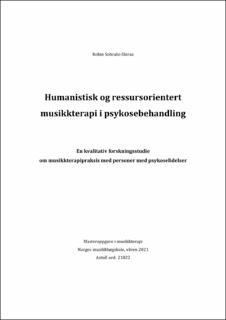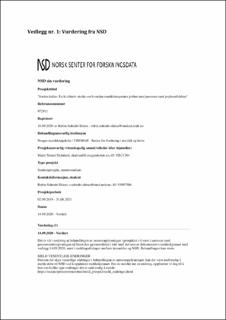| dc.contributor.author | Sohrabi-Shiraz, Robin | |
| dc.date.accessioned | 2021-10-12T11:58:06Z | |
| dc.date.available | 2021-10-12T11:58:06Z | |
| dc.date.issued | 2021 | |
| dc.identifier.uri | https://hdl.handle.net/11250/2789316 | |
| dc.description | Norges musikkhøgskole. Masteroppgave. Musikkterapi | en_US |
| dc.description.abstract | Sammendrag -
Denne masteroppgaven utforsker musikkterapipraksis med personer med psykoselidelser som mottar behandling i psykisk helsevern. Empirien stammer fra semistrukturerte forskningsintervju med fire musikkterapeuter. Forskningstilnærmingen er kvalitativ og hermeneutisk-fenomenologisk. Problemstillinger er: Hvordan jobber musikkterapeuter med personer med psykoselidelser?
Den tematiske analysen resulterte i tre kjernekategorier og ni underkategorier. Kjernekategorien Musikkterapi i psykosebehandling fikk underkategoriene motivasjon og samhandling, identitet, relasjoner og sosiale roller, emosjoner og følelser og positive symptomer. Kjernekategorien Tilnærminger fikk underkategoriene til pasienten og klinisk praksis og til tverrfaglig samarbeid. Kjernekategorien Bruksområder for musikkterapi fikk underkategoriene et pauserom, arbeid med det som er vanskelig og overgang til hverdagen. Disse fenomenene utforskes gjennom humanistisk, ressursorientert og relasjonelle teoretisk perspektiv.
Resultatene viser at humanistisk og ressursorientert musikkterapipraksis med personer med psykoselidelser kan fremme bedring, støtte verbal og nonverbal kommunikasjon, motivivere til sosial deltakelse og behandling, samt underbygge empowerment og recovery-prosesser. Individuell musikkterapi og gruppetilnærminger rettes mot behandling av negative, positive og kognitive symptomer ved psykose. Mer forskning kan rettes mot metodisk bruk av intersubjektivitet, nonverbal og affektiv kommunikasjon og inntoning gjennom musikk, samt rhythmic entrainment og fysiske tilnærminger til musikkterapi i praksis med personer med psykoselidelser. Disse samt identitetsfremmende prosesser fremstår som særlig relevante for en behandlingstilnærming til psykoseproblematikk.
Emneord: Musikkterapi, psykisk helse, psykose, schizofreni, identitet, recovery, empowerment, affektinntoning, rhythmic entrainment, intersubjektivitet | en_US |
| dc.description.abstract | Abstract
This master thesis explores the practice of music therapy with patients with psychotic disorders receiving government healthcare treatment. The empirical data stems from semi structured research interviews with four music therapists about their experiences with the area of practice. The study takes a qualitative, hermeneutic phenomenological approach, asking the research question: How do music therapists work in clinical practice with individuals with psychosis?
The thematic analysis revealed three core categories and nine subcategories. The core category Music Therapy in the treatment of psychosis has the subcategories motivation and interaction, identity, relations and social roles, emotions and feeling and positive symptoms. The core category Approaches has the subcategories to the patient and clinical practice and to interdisciplinary collaboration. The core category Applications for practice has the subcategories a breakroom, to wotk with difficult issues and transition to everyday life. These categories are explored through the theoretical framework of humanistic resource oriented relational music therapy.
The results imply that humanistic and resource-orientated approaches to music therapy may encourage recovery, support verbal and nonverbal communication, encourage motivation, social inclusion and treatment, as well as support empowerment and personal recovery. Individual and group approaches are directed at treating negative, positive and cognitive symptoms of psychosis. More research may be given into methodic application of intersubjectivity, nonverbal and affect communication and attunement in music, as well as rhythmic entrainment and physical approaches to music therapy in practice with individuals with psychotic disorders. These as well as identity supporting processes seem particularly relevant for treatment approaches to the challenges of psychosis.
Keyword: Music therapy, mental health, psychosis, schizophrenia, identity, affect-attunement, rhythmic entrainment, intersubjectivity | en_US |
| dc.language.iso | nob | en_US |
| dc.publisher | Norges musikkhøgskole | en_US |
| dc.relation.ispartofseries | Norges musikkhøgskole. Masteroppgave. Musikkterapi;2021 | |
| dc.subject | musikkterapi | en_US |
| dc.subject | psykisk helse | en_US |
| dc.subject | psykose | en_US |
| dc.subject | schizofreni | en_US |
| dc.subject | identitet | en_US |
| dc.subject | recovery | en_US |
| dc.subject | empowerment | en_US |
| dc.subject | affektinntoning | en_US |
| dc.subject | rhythmic entrainment | en_US |
| dc.subject | intersubjektivitet | en_US |
| dc.subject | music therapy | en_US |
| dc.subject | mental health | en_US |
| dc.subject | psychosis | en_US |
| dc.subject | schizophrenia | en_US |
| dc.subject | identity | en_US |
| dc.subject | affect-attunement | en_US |
| dc.subject | intersubjectivity | en_US |
| dc.title | Humanistisk og ressursorientert musikkterapi i psykosebehandling. En kvalitativ forskningsstudie om musikkterapipraksis med personer med psykoselidelser | en_US |
| dc.type | Master thesis | en_US |
| dc.subject.nsi | VDP::Humaniora: 000::Musikkvitenskap: 110::Musikkterapi: 113 | en_US |
| dc.source.pagenumber | [19], 103 s. | en_US |

